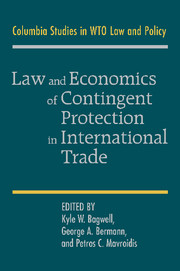Book contents
- Frontmatter
- Contents
- Contributors
- Introduction
- 1 An Overview of the Agreement on Subsidies and Countervailing Measures – Including a Discussion of the Agreement on Agriculture
- 2 Do the World Trade Organization Disciplines on Domestic Subsidies Make Sense? The Case for Legalizing Some Subsidies
- 3 Subsidies and Countervailing Measures: Determining the Benefit of Subsidies
- 4 The Enduring Problem of World Trade Organization Export Subsidies Rules
- 5 The Boeing–Airbus Dispute: A Case for the Application of the European Community State Aid Rules?
- 6 Antidumping: Overview of the Agreement
- 7 Price Differentiation in Antitrust and Trade Instruments
- 8 Nonpreferential Origin Rules in Antidumping Law and Practice
- 9 The Appellate Body Interpretation of “Sunset Reviews” Provisions of Anti-Dumping and Countervailing Measures Agreements: A Critical Analysis
- 10 The Safeguards Agreement – An Overview
- 11 Why Are Safeguards Needed in a Trade Agreement?
- Index
- References
2 - Do the World Trade Organization Disciplines on Domestic Subsidies Make Sense? The Case for Legalizing Some Subsidies
Published online by Cambridge University Press: 03 May 2010
- Frontmatter
- Contents
- Contributors
- Introduction
- 1 An Overview of the Agreement on Subsidies and Countervailing Measures – Including a Discussion of the Agreement on Agriculture
- 2 Do the World Trade Organization Disciplines on Domestic Subsidies Make Sense? The Case for Legalizing Some Subsidies
- 3 Subsidies and Countervailing Measures: Determining the Benefit of Subsidies
- 4 The Enduring Problem of World Trade Organization Export Subsidies Rules
- 5 The Boeing–Airbus Dispute: A Case for the Application of the European Community State Aid Rules?
- 6 Antidumping: Overview of the Agreement
- 7 Price Differentiation in Antitrust and Trade Instruments
- 8 Nonpreferential Origin Rules in Antidumping Law and Practice
- 9 The Appellate Body Interpretation of “Sunset Reviews” Provisions of Anti-Dumping and Countervailing Measures Agreements: A Critical Analysis
- 10 The Safeguards Agreement – An Overview
- 11 Why Are Safeguards Needed in a Trade Agreement?
- Index
- References
Summary
Introduction
Prior to the Uruguay Round, the multilateral trading system did not contain any enforceable legal disciplines on domestic subsidies. The treatment of such subsidies in the General Agreement on Tariffs and Trade (GATT) was ambiguous: On the one hand, their legitimacy as tools of public policy was affirmed while their capacity to distort trade was also acknowledged. On the other hand, self-help against such subsidies was permitted in the form of countervailing duties (CVDs), provided that the subsidies caused “material injury” to domestic industry in the importing country. The Uruguay Round Agreement on Subsidies and Countervailing Measures (SCM Agreement) introduced a category of domestic subsidies called “actionable,” which can be challenged in World Trade Organization (WTO) dispute settlements, thus for the first time providing a multilateral legal remedy against subsidization. For a subsidy to be challenged in a WTO dispute settlement as actionable, it has to fall within the definition of subsidy in Article 1 of the SCM Agreement, which means it must entail a “financial contribution” governmental financial assistance to firms (from cash payments to equity infusions to provision of goods and services below market prices), and also confer a “benefit” on an enterprise; the subsidy must also be “specific,” either de jure (legally targeted at a particular industry or enterprise or group of industries or enterprises) or de facto (in fact used only or disproportionately by a particular industry or enterprise or group of industries or enterprises).
- Type
- Chapter
- Information
- Publisher: Cambridge University PressPrint publication year: 2009
References
- 3
- Cited by



